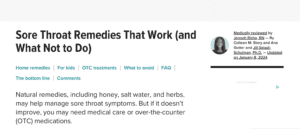If you’ve been keeping track of the SEO world, you’ll know how important E-E-A-T is when it comes to improving your rankings and visibility online.
Are you new to Expertise, Experience, Authority and Trust? Is your content struggling to rank without ‘experience’? This guide should help.
As an SEO agency with an in-house content team, developing our E-E-A-T strategy continues to be instrumental to our clients’ success.
In this blog, we’ll explore:
- How Google defines ‘experience’ and what that means for websites (and SEO)
- YMYL websites and the importance of authorship
- Why users care about first-hand experience
- How to demonstrate experience effectively within your content
(Psst… If you don’t know much about it or feel like you need a refresher, take a read through our E-E-A-T guide to get to grips with the guidelines!)
For more information on how we approach writing quality content for our clients, get in touch at info@embryo.com.
What does Google say about ‘experience’ in the E-E-A-T guidelines?
Before December 2022, you may have known these guidelines as ‘E-A-T’. It was only during the latest review of Google’s Search Quality Rater Guidelines that the extra ‘E’ was added to the mix. Here’s what the update had to say:
“Does content also demonstrate that it was produced with some degree of experience, such as actual use of a product, having visited a place, or communicating what a person experienced?”
As it stands, Google considers a website’s overall Expertise, Experience, Authority and Trustworthiness to determine its legitimacy and relevancy to those using the search engine. The quality guidelines are a crucial part of how Google ranks content for each given search term. E-E-A-T is about filtering out spammy and untrustworthy websites and serving up helpful content.
Incorporating ‘experience’ into the quality guidelines adds an extra layer, but it’s not as complex or difficult to navigate as you might think.
What does demonstrating first-hand experience mean and why does it matter?
Experience refers to an individual or entity’s actual involvement or exposure to an event, activity or product. It’s the evidence of actual knowledge acquired through real involvement. This affirms the legitimacy of the information written on a website.
Let’s consider an article on diagnosing patients with a medical condition. Google’s quality guidelines would evaluate the author’s firsthand experience in the subject. We expect the author to possess both expertise and practical knowledge in the field to provide a reliable comment or opinion.
See below from Healthline. Here, we’re dealing with a YMYL (Your Money Your Life) website. This means that the information presented has a physical, mental or financial impact on its readers. YMYL websites are especially under the radar as far as E-E-A-T is concerned, but Healthline navigates it well.

The author bio reinforces the authority behind the writer and their expertise in the field. By clicking through the hyperlinks to the right, the reader (and crawl bots) are led to further information that verifies the author’s background.
Why do users care about the first-hand experience?
You might remember Google’s product review update in 2021. A much-needed update meant reviewers must provide evidence of their actual usage and ownership of a product before reviewing it. Whether that be through imagery, videos or purchase receipts, a reviewer must support the authenticity of their review.
This seems to have been the starting point for what we now know as ‘experience’.
There are many situations in life, humans, where gaining insight into a person’s life experience can become invaluable to our decision-making process. Here are just a couple of scenarios where experience matters most:
- Evaluation stage of the buying journey: From TikTok’s ‘honest reviews’ to TripAdvisor reviews, consumers in the ‘messy middle’ of their journey spend a lot of time researching. When 74% of buyers look for reviews before they choose to spend their money, it’s no wonder that first-hand experience takes priority in the search engine results.
- Financial or medical research: As we just established, YMYL topics like financial and medical subjects are incredibly sensitive. Google’s quality evaluators specifically scrutinise content for misinformation in these cases, making the highest level of E-E-A-T crucial. Users must be presented with content in these areas written from firsthand experience and/or with proven expertise.
- Troubleshooting and product issues: Sometimes, the best resolution to problems lies in user-generated content. If you’re anything like me, you’ll turn to users on Reddit for help troubleshooting equipment or fixing problems. Experience-led content showcases actual usage and offers practical solutions.
How to demonstrate the new ‘E’ in E-E-A-T
Enhance your content strategy for 2024 and beyond by including content from real users and individuals with genuine expertise in the subject. It’s as simple as that— real people sharing real experiences.
Depending on your website’s nature, consider adjusting your content strategy to incorporate ‘experience.’ We suggest starting with keyword research and analysing user search intent to gauge the significance of experience on the SERPs for those specific keywords or topics.
Below are just a few E-E-A-T frameworks you can utilise within your content strategy.
Social proof is an invaluable psychological phenomenon that any website can use. While it may not reflect your personal experience, this content highlights your customers’ positive interactions with your business. This is why trust signals like testimonials and Trustpilot reviews make a huge difference to your overall E-E-A-T score.
User-generated content, such as customer photos or video footage, is another way of displaying your legitimacy as a business. It adds to the credibility of your business and enhances the user experience.
2. Author information
As we explored earlier, providing author information is a key component of E-E-A-T. At Embryo, we make it our priority to help our clients refine (or create from scratch) their authorship pages. You effectively display your teams’ experience and authenticity by detailing their qualifications, contributions to the business and specialisms. This personalised touch helps Google connect the dots between the information in the content and the expertise of the writer.
Remember, the more genuine and qualified you appear, the more likely you will be recognised as an authoritative source in your industry.
3. Expert collaborations
If you really want to level up your E-E-A-T, collaborating with other industry experts is a great way to go about it. When representing experience in certain related subjects becomes challenging, experts can step in. Having someone knowledgeable in a topic review your content, provide comments, or be interviewed on it perfectly exemplifies the ‘E’ in E-E-A-T.
Plus, sharing a link to their page and having them share your content strengthens your authority.
4. Troubleshooting guides and tutorials
Earlier on, we discussed the heavy reliance on user-generated content and forums like Reddit for troubleshooting guidance. Get ahead of those users and provide your own guides or video tutorials. This way, you can answer common questions, address any issues directly from your own website and ultimately set up a strong eCommerce SEO strategy.
Producing content like this demonstrates your first-hand experience by proactively addressing solutions on your website. It shows your reliability as a brand and the authenticity of the products you sell. This is how you gain trust from users and search engines alike.
5. Case studies
There’s no better way of evidencing your experience in your industry than by producing case studies. By consistently showing your engagement and providing real-life examples of how your business assisted others, your site becomes perceived as E-E-A-T friendly by Google. This not only validates your experience and legitimacy but also reinforces your trustworthiness as a website.
Is your site E-E-A-T friendly? Let Embryo put it to the test
We know that wrapping your head around Google’s thousands of guidelines and requirements is incredibly difficult. That’s why we’re here to help.
Over the past year, we’ve worked hard to develop and incorporate E-E-A-T best practices into our content strategy. Lucky for you, we know what we’re doing when it comes to optimising your website for SEO and E-E-AT.
If a high-quality content strategy is what you need, you can count on us for this. If you like the frameworks listed in this blog, we’ve got plenty more stashed in our toolboxes!
Learn More:













